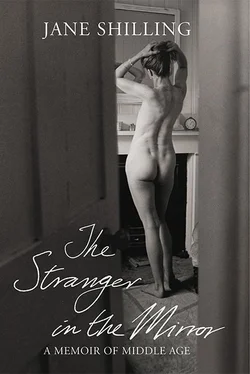Perhaps her parents and mine saw in my aunt’s untimely distress the graceless emotional lability of menopause; the sadness of the middle-aged spinster sans husband, children, love or hearth of her own; the empty, purposeless female about to spend Christmas night in a narrow, candlewick-covered single bed in her parents’ spare bedroom for want of any more pressing domestic attachment while we returned to our own cheery home, littered with the bright trash of a successful family Christmas, lights twinkling, toys strewn, the larder fat with succulent leftovers, a plaster baby Jesus snug in his crib at the centre of the Nativity scene arranged on the mantelshelf, the cat stalking the feathered robins perched on the lower branches of the Christmas tree.
I was too young to diagnose hormonal perturbation as the cause of her unhappiness but I picked up the disapproving frisson that trailed her out of the room; sensed the disturbance she’d caused by letting her misery be seen, subverting in the process the intricate mechanism of suppression by means of which everyone else managed to keep up appearances.
For decades after I left home for university I scarcely saw my aunt. The image of her weeping over the tea trolley as the television muttered inaudibly in the corner became a comic shorthand for everything that was wrong with a family Christmas. But by degrees she came to seem to me the heroine of the scene. From the general impression of hot overstuffed dreariness there crystallised a sense of her longing for the chill simplicity of the newborn child, the starlit night, the angels singing, the startled shepherds in the dark fields. Her misery at not finding anything resembling that truth among the red velvet curtains, the unwanted food and the constrained discourse of her family struck me in retrospect as the only authentic emotional response in a roomful of complicated evasions.
Time passed. My aunt and I met at intervals – family occasions mainly, unconducive to all but the most formulaic of conversations, and our paths diverged. In the summer of the year that my son turned 14 she invited us to her eightieth birthday party, a gathering in a church hall to which she wore a pale blue robe embroidered in silver – a souvenir of a trip to Egypt. She seemed surprisingly well travelled, for an aunt.
The hall was filled with a jostling mixture of ages and nationalities. Across the room I caught sight of my own profile, as though glimpsing a reflection of myself at an unexpected angle in a mirror, and recognised with a shock a cousin whom I hadn’t seen since we were children. He was an excise man now: tall, handsome, reticent, with an edge of off-duty authority.
Chatting to the babel of friends in the hall, I began to discover things I didn’t know, or only half knew, about my aunt. She was an ordained priest. A prison visitor. A campaigner for the rights of refugees, some of whom she had occasionally sheltered in her own house. Without detaching herself from her family (for here we were, some of us, meeting one another for the first time in years at her party – and what a very curious sensation that was) she had invented a world for herself, a place of safety, surrounded by these friends.
I would have pursued this line of thought, but music struck up and there appeared a venerable belly dancer in orange drapery and silver anklets, flashing a roguish expanse of naked flesh between breast and haunches that scandalised my prudish son. I hadn’t been to an eightieth birthday party before, but this one seemed livelier than I had anticipated.
Some weeks later my aunt asked me if I wanted to take a trip with her to the Isle of Sheppey, where her mother had grown up in her grandparents’ farmhouse. Generations of Jarretts and Hinges – her parents’ and grandparents’ families; my ancestors – lay buried in Iwade churchyard, on the landward side of the Swale.
I knew their names already – they were written in a spidery copperplate hand in a heavy old family bible with thick, rippled pages and a flaking brown leather binding reeking of must and age. As a child I had copied them into the back of my own bible, a handsome little volume printed on fine, gilt-edged India paper with a scarlet leather binding, given me by my aunt as a christening present. I said yes to the trip, but shyly, wondering whether we would find enough conversation to keep us going for a whole day.
Sheppey is an island – or rather a small archipelago silted into a single entity – in the Thames Estuary, the last before the estuary empties into the sea. The island looks north across open water to Essex, and south towards Kent, from which it is separated by a narrow channel, the Swale. Low-lying, marshy, windswept, it is home to sheep, birds, prisoners, caravans, container ships, ancient churches and bungalows. I grew up within sight of the island, in Sittingbourne, but had never been there. Girls from Sheppey attended my school. They arrived by train and had the unruly, raffish air of people who make a daily trip across water to the mainland.
On the mainland side, the charmless Saxon villages straggle at intervals along the straight Roman road, bordered with orchards of cherry and apple, dwindling towards the muddy shoreline into flat marshland, a place of sheep, birds and the rotting hulks of old barges, half sunk in brackish ooze like tarpit mammoths. On the island the homely prettiness of fertile land is absent. Here are no fruit gardens, no undulating slopes, only wind, sky and water that seem ready to overwhelm at any moment the scabbed encrustation of human activity.
My aunt drove across the newly built Sheppey crossing with the defiant expertise of someone who had learned to drive when it was still a bold thing for a girl to do; then turned off the main road towards Harty, where the Ferry House Inn stands above the old ferry slipway. It was a fine blue-grey September day after a sodden summer. The willow leaves were turning yellow; the rosehips scarlet in the hedges. We rounded a sharp corner where high hedges parted on a vista of bleached grassland shading to a flat, watery horizon. Perched on the blasted branch of a dead tree to our right was a curious shape – stout, feathery, head sunk between sloping shoulders. Oh, stop! I said. It’s an owl.
It was a barn owl, perching with its back turned towards us – a startling orange-tawny. As we got out of the car and drew near it swivelled its head so that its crisp white doily of a face was turned towards us, and stared through us with blank sloe eyes, then spread its wings and flew driftingly away down the hedge line. Small brown birds haunted the fields as we drove; a weasel looped across the track as we turned into the Ferry House Inn. We ate lunch alone in the empty dining room, looking out over mudflats where the seagulls mewed and the boats lay aslant, waiting for the tide to refloat them.
The farmhouse where my grandmother grew up had gone, my aunt said. From time to time she used to visit it with her mother, but over the years it had declined into a barn, a hay store, then fallen into disrepair and at last into ruin, reabsorbed into the windblown coarse grassland as though pressed into nothingness by the elemental horizontals of the landscape of air, earth and water.
In Iwade churchyard we crouched on the mown grass in the low shadow of the flint church to read the gravestones of the people who had lived in that vanished farmhouse: William Hinge and his wife, Helen, both dead at 58, then a dismal list of dates recording the brief lives of my infant ancestors: William Henry, died 2 June 1864, aged 10 months; Louisa Fanny, born 10 September 1864, died the next day. William Archibald, died 19 August 1873, aged 15 months.
Perhaps the parents of Helen Elizabeth and Florence Emily thought they were safe. They survived the croups and agues, the fits and rashes and inexplicable failures to thrive to which their baby siblings had succumbed. They grew into big girls, old enough to make themselves useful to their parents – help around the house, look after the younger children, tend the sheep that cropped the poor pasture. But death came all the same, in the high summer of 1875 for Helen Elizabeth, who would have been eight in December; in dead of winter for Florence Emily, aged 13 years and 9 months on 22 January 1892.
Читать дальше












